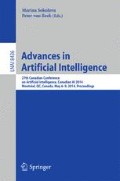Abstract
Geospatial clustering is an important topic in spatial analysis and knowledge discovery research. However, most existing clustering methods clusters geospatial data at data level without considering domain knowledge and users’ goals during the clustering process. In this paper, we propose an ontology-based geospatial cluster ensemble approach to produce good clustering results with the consideration of domain knowledge and users’ goals. The approach includes two components: an ontology-based expert system and a cluster ensemble method. The ontology-based expert system is to represent geospatial and clustering domain knowledge and to identify the appropriate clustering components (e.g., geospatial datasets, attributes of the datasets, and clustering methods) based on a specific application requirement. The cluster ensemble is to combine a diverse set of clustering results produced by recommended clustering components into an optimal clustering result. A real case study has been conducted to demonstrate the efficiency and practicality of the approach.
Access this chapter
Tax calculation will be finalised at checkout
Purchases are for personal use only
Preview
Unable to display preview. Download preview PDF.
References
Ng, R., Han, J.: Efficient and Effective Clustering Method for Spatial Data Mining. In: Proc. of 20th International Conference on Very Large Data Bases, pp. 144–155. Morgan Kaufmann, San Francisco (1994)
Shekhar, S., Chawla, S.: Spatial Databases: A Tour. Prentice Hall (2003)
Graco, W., Semenova, T., Dubossarsky, E.: Toward knowledge-driven Data Mining. In: Proc. of International Workshop on Domain Driven Data Mining at 13th ACM SIGKDD, pp. 49–54. ACM, New York (2007)
Wang, X., Gu, W., Ziebelin, D., Hamilton, H.: An Ontology-based Framework for Geospatial Clustering. International Journal of Geographical Information Science 24, 1601–1630 (2010)
Wang, X., Hamilton, H.J.: Towards an Ontology-based Spatial Clustering Framework. In: Kégl, B., Lee, H.-H. (eds.) Canadian AI 2005. LNCS (LNAI), vol. 3501, pp. 205–216. Springer, Heidelberg (2005)
Mitropoulos, P., Mitropoulos, I., Giannikos, I., Sissouras, A.: A Biobjective Model for the Locational Planning of Hospitals and Health Centers. Health Care Management Sci. 9, 171–179 (2006)
Liao, K., Guo, D.: A Clustering-Based Approach to the Capacitated Facility Location Problem. Trans GIS 12, 323–339 (2008)
Prabakara Raj, S.R., Ravindran, B.: Incremental Constrained Clustering: A Decision Theoretic Approach. In: Li, J., Cao, L., Wang, C., Tan, K.C., Liu, B., Pei, J., Tseng, V.S. (eds.) PAKDD 2013 Workshops. LNCS, vol. 7867, pp. 475–486. Springer, Heidelberg (2013)
Wang, X., Rostoker, C., Hamilton, H.J.: Density-based Spatial Clustering in the Presence of Obstacles and Facilitators. In: Boulicaut, J.-F., Esposito, F., Giannotti, F., Pedreschi, D. (eds.) PKDD 2004. LNCS (LNAI), vol. 3202, pp. 446–458. Springer, Heidelberg (2004)
Alberta Breast Cancer Screening Program website, http://www.cancerboard.ab.ca/abcsp/program.html
Thiago, F.C., Eduardo, R.H., Joydeep, G.: A Study of K-Means-based Algorithms for Constrained Clustering. J. Intelligent Data Analysis 17, 485–505 (2013)
Han, J.W., Kamber, M., Pei, J.: Data Mining: Concepts and Techniques, 3rd edn. Morgan Kaufmann, San Francisco (2011)
Strehl, A., Ghosh, J.: Cluster Ensembles A Knowledge Reuse Framework for Combining Multiple Partitions. Machine Learning Research 3, 583–617 (2002)
Fern, X.Z., Lin, W.: Cluster Ensemble Selection. Journal of Statistical Analysis and Data Mining 1, 128–141 (2008)
Gruber, T.R.: A Translation Approach to Portable Ontologies. Knowledge Acquisition 5, 199–220 (1993)
Data quality index for census geographies, http://www12.statcan.ca.ezproxy.lib.ucalgary.ca/census-recensement/2006/ref/notes/DQ-QD_geo-eng.cfm
Ng, M.K.: A Note on Constrained k-means Algorithms. Pattern Recognition 33, 515–519 (2000)
Fonseca, F., Egenhofer, M., Agouris, P., Cmara, G.: Using Ontologies for Integrated Geographic Information Systems. Transactions in GIS 6, 231–257 (2002)
Maedche, A., Zacharias, V.: Clustering Ontology-based Metadata in the Semantic Web. In: Elomaa, T., Mannila, H., Toivonen, H. (eds.) PKDD 2002. LNCS (LNAI), vol. 2431, pp. 348–360. Springer, Heidelberg (2002)
Worboys, M.F.: Metrics and Topologies for Geographic Space. In: Advances in Geographic Information Systems Research II: International Symposium on Spatial Data Handling (1996)
Egenhofer, M.J., Clementini, E., di Felice, P.: Topological Relations between Regions with Holes. International Journal of Geographical Information Systems 8, 129–142 (1994)
Papadias, D., Egenhofer, M.: Hierarchical Spatial Reasoning about Direction Relations. GeoInformatica 1, 251–273 (1997)
Egenhofer, M.J., Franzosa, R.D.: Point-Set Topological Spatial Relations. International Journal of Geographical Information Systems 5, 161–174 (1991)
Protg web site, http://protege.stanford.edu/index.html
Crubzy, M., Musen, M.: Ontologies in Support of Problem Solving. In: Staab, S., Studer, R. (eds.) Handbook on Ontologies, pp. 321–341. Springer, Heidelberg (2004)
Parmentier, T., Ziébelin, D.: Distributed Problem Solving Environment Dedicated to DNA Sequence Annotation. In: Fensel, D., Studer, R. (eds.) EKAW 1999. LNCS (LNAI), vol. 1621, pp. 243–258. Springer, Heidelberg (1999)
Teitz, M.B., Bart, P.: Heuristic methods for estimating the generalized vertex median of a weighted graph. Oper. Res. 16, 955–961 (1968)
Naldi, M.C., Carvalho, A.C.P.L.F., Campello, R.J.G.B.: Cluster Ensemble Selection Based on Relative Validity Indexes. Data Mining and Knowledge Discovery 27, 259–285 (2013)
Sarumathi, S., Shanthi, N., Santhiya, G.: A Survey of Cluster Ensemble. International Journal of Computer Applications 65, 8–11 (2013)
Author information
Authors and Affiliations
Editor information
Editors and Affiliations
Rights and permissions
Copyright information
© 2014 Springer International Publishing Switzerland
About this paper
Cite this paper
Gu, W., Zhang, Z., Wang, B., Wang, X. (2014). Use of Ontology and Cluster Ensembles for Geospatial Clustering Analysis. In: Sokolova, M., van Beek, P. (eds) Advances in Artificial Intelligence. Canadian AI 2014. Lecture Notes in Computer Science(), vol 8436. Springer, Cham. https://doi.org/10.1007/978-3-319-06483-3_11
Download citation
DOI: https://doi.org/10.1007/978-3-319-06483-3_11
Publisher Name: Springer, Cham
Print ISBN: 978-3-319-06482-6
Online ISBN: 978-3-319-06483-3
eBook Packages: Computer ScienceComputer Science (R0)

